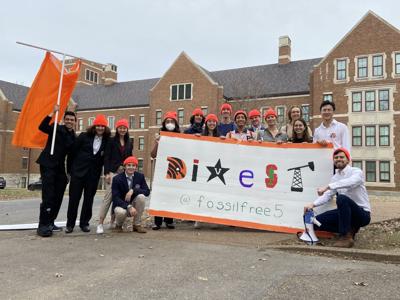On Wednesday, Vanderbilt student group Dores Divest filed a complaint with state Attorney General Herbert Slatery III regarding Vanderbilt University’s Board of Trust. The complaint argues that the university’s investments in the fossil fuel industry violate the Tennessee Uniform Prudent Management of Institutional Funds Act.
The TUPMIFA states that nonprofit and charitable institutions like the Vanderbilt Board of Trust must invest with prudence and “good faith,” considering aspects like economics and “charitable purpose.”
“The Vanderbilt Board of Trust has failed to consider the charitable purposes of the institution and the purposes of the institutional fund by financially supporting the degradation of the climate, widespread damage to ecological and human health, and massive injuries to environmental and social equity,” reads the complaint. It also notes that “fossil fuels have been among the worst performing investments in the last decade.” The complaint holds endorsements from Vanderbilt students, the Vanderbilt Chapter of the American Association of University Professors, environmentally minded organizations and names like Bill McKibben, Noam Chomsky and Karenna Gore, among others.
The complaint from Dores Divest resembles those of four other university student groups across the country. The groups recently filed similar complaints in an effort to get universities to divest from fossil fuels and include students from Princeton, Yale, Stanford and the Massachusetts Institute of Technology. The coalition of student groups is calling itself the Fossil-Free Five, and each of the groups has received assistance with legal filings from the Climate Defense Project.
“Vanderbilt and the other schools in these complaints are public charitable corporations,” says Alex Marquardt, co-founder of and staff attorney for the Climate Defense Project. “Many of the duties owed by the fiduciaries of public charities are similar to those owed by the trustees of private trusts, such as the duties of care and loyalty and the duty to invest funds prudently. But charities are also required to promote the public interest, in exchange for tax exemption, and to further their own particular charitable purposes — which, for universities, includes their educational mission and any other purposes described in their charter or governing documents.
“These duties extend to the management of the endowment," Marquardt continues. "A law called UPMIFA codifies the financial aspects of fiduciary duty; it’s on the books in every state except Pennsylvania.”
The Climate Defense Project has already used this legal approach with Harvard and Cornell universities — both of which have committed to divesting from fossil fuels. Though Marquardt says they cannot specifically tie the universities’ decisions to the legal complaints, “the timing and, in Harvard’s case, the reference to fiduciary duty in the president’s announcement” indicate that the filings likely urged the universities’ decisions.
Another aspect of Vanderbilt’s specific legal complaint mentions how Chancellor Daniel Diermeier and other members of the Board of Trust have connections to the fossil fuel industry that present a conflict of interest. “These apparent conflicts of interest violate the Board of Trust’s duty of loyalty because fossil fuel companies’ business models are in fundamental tension with Vanderbilt’s espoused values and commitment to decarbonization,” the complaint reads.
Last month, a conflict of interest complaint was filed at Vanderbilt regarding Diermeier’s connections to the fossil fuel industry, but the investigation found no wrongdoing and has since been closed. Dores Divest member Celia Waldman says the outcome was “definitely disappointing but not surprising at all.”
Vanderbilt University could not be reached for a response regarding the complaint.





